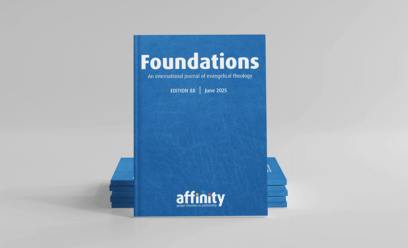Insights from Robert Letham: Theology, Culture, and the Proof of God
Recently Paul Yeulett, Chair of the Affinity Theological Study Conference, had the privilege of speaking with Bob Letham, an esteemed theologian and Senior Research Fellow at Union School of Theology. Dr Letham’s extensive background in teaching, pastoring, and writing has made him a significant voice in Christian theology. In this interview, which you can watch below, he offers valuable insights on culture, Christian identity, and theology’s role in understanding God. He also gives a preview of his upcoming paper for the Affinity Theological Study Conference.
Introducing Dr Bob Letham: A Theologian’s Journey
When asked about his own journey, Dr Letham shared a bit about his life and ministry across the United States and the United Kingdom. Having lived for nearly three decades in America, he noted some surprising cultural contrasts, especially regarding attitudes towards Christianity. In the U.S., he observed, it’s still common for people to openly identify as Christians – something he feels is becoming less common in the UK. This cultural difference, he says, is one example of how secularisation has advanced in the UK.
Raised in a Christian home, Dr Letham’s faith deepened during his teenage years, leading him to pursue ministry. Later, he decided to combine pastoral work with theological study and teaching.
Theology for All: Why It Matters
One of Dr Letham’s most profound insights is that every Christian, in a sense, is a theologian. Theology isn’t just for academics; it’s about knowing and understanding the God we love. He likened it to a personal relationship, saying that if you truly love someone, you naturally want to know more about them. Understanding doctrines like the Trinity, he argues, isn’t just for academics; it’s essential for every believer. After all, the doctrine of the Trinity reveals who God is and underpins the gospel itself.
For Dr Letham, the study of theology isn’t confined to formal education. Some of the best theologians he knows, he says, have no formal training. His conviction is that theology springs from a sincere desire to understand God more deeply – a calling that every believer can pursue.
The Influence of Church History: Learning from the Greek Fathers
Dr Letham’s academic journey has been shaped by thinkers from the early church, especially the Greek Fathers. His doctoral studies under James Torrance led him to a deep appreciation for theologians like Athanasius and Cyril, whose writings on the Trinity and Christology are crucial for understanding God. ‘The doctrines of the Trinity and the person of Christ,’ he explains, ‘were hammered out in the early church and remain foundational.’
When asked how early church insights apply today, he highlighted the importance of reading widely and learning critically. No theologian, he noted, should be followed blindly. Instead, we must learn to evaluate their contributions, discerning the truths that align with Scripture while acknowledging each theologian’s unique perspective and context.
What’s Missing in Modern Evangelicalism?
A recurring theme in our discussion was the decline in serious theological reading within modern churches. Dr Letham has observed that congregations in the UK are less inclined to engage with doctrinally rich materials compared to those in the US. He sees this as a significant issue, particularly when it comes to crucial doctrines like Christology and the Trinity. Without a solid grounding, Christians risk sliding into doctrinal errors that compromise the very foundation of their faith.
He also expressed concern about a tendency among some modern Christians to refer to Christ’s divine and human natures as if they were separate agents. This, he warned, is a misunderstanding that can lead to dangerous theological territory. Getting these doctrines right is essential because, without a clear understanding of who Christ is, our entire salvation is at stake.
Can We ‘Prove’ the Existence of God?
Dr Letham’s upcoming paper for the Affinity Theological Study Conference explores classical proofs of God’s existence, such as the ontological, cosmological, and teleological arguments. But he’s quick to clarify that these ‘proofs’ may not be what many expect. Unlike mathematical proofs, these arguments are less about irrefutable logic and more about rational investigation. The medieval theologians who developed these arguments – Anselm and Aquinas, for example – weren’t aiming to convince unbelievers. Instead, they sought to show that faith and reason could harmonise.
While these proofs may offer some value, Dr Letham stressed that they often fall short of revealing the fullness of the Christian God. They may point to a ‘supreme entity’ but not necessarily to the God who has revealed himself as Father, Son, and Holy Spirit. For believers, recognising God in creation and engaging with him personally is often more powerful than abstract reasoning.
A Call for Rediscovery
When asked about what Dr Letham believes modern Christians most need to rediscover he urged believers to return to the Scriptures and the teachings of the early church. The early church councils, he said, are a treasure trove of foundational truths that the Reformation and later theologians built upon. Returning to these teachings offers a richer, more rooted understanding of our faith.
Dr Letham’s advice? Familiarise yourself with the early councils up to at least the Council of Chalcedon in 451. He encouraged modern Christians to explore the councils of Constantinople II and III. For Dr Letham, these councils represent centuries of Spirit-led interpretation of the Bible which are immensely valuable for modern believers.
Dr Letham’s deep, thoughtful perspective reminds us that theology isn’t a distant, academic pursuit. It’s about knowing and loving the God who first loved us. For every Christian, growing in faith should mean growing in understanding – of who God is, what he has done, and how we relate to him.
Stay connected with our monthly update
Sign up to receive the latest news from Affinity and our members, delivered straight to your inbox once a month.


